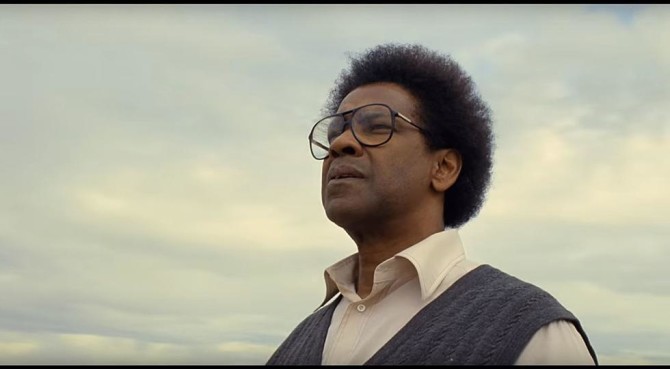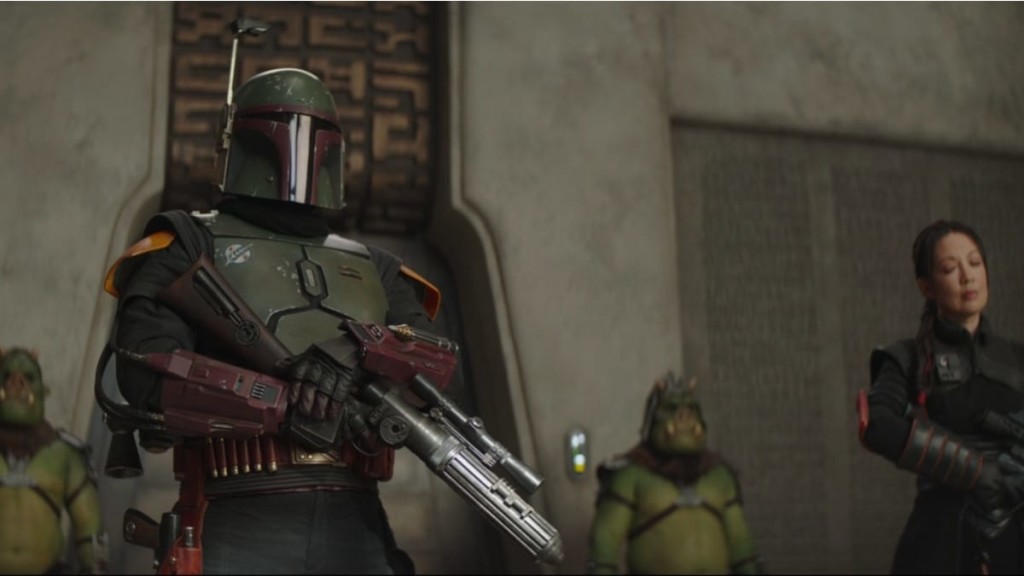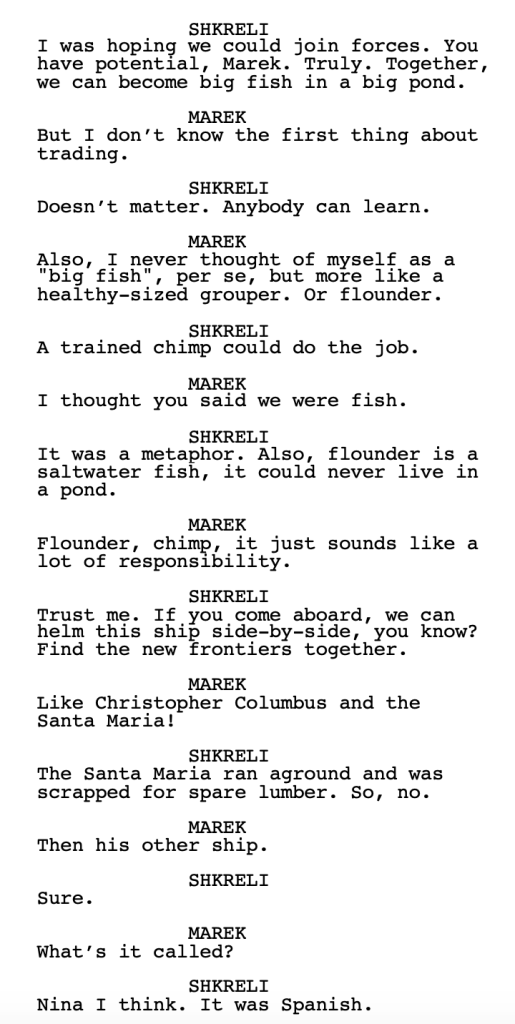Genre: Sci-Fi/Drama
Premise: A famed experimental musician finds himself embroiled in the race to solve Earth’s primary existential threat: A deafening sound that never stops, forcing all of humanity to survive in silence.
About: This script finished in the top 15 of last year’s Black List.
Writer: Whit Burnham Brayton
Details: 119 pages
I was really looking forward to this one. I love myself a good sci-fi setup and I’ve never encountered anything quite like this concept before. Sound can be terrifying in the right situation. Whit Brayton seems to have found that situation. Let’s see if the script delivers.
A few years into our future, a sound emanating from within the earth’s atmosphere has taken hold of the planet. It’s so loud and so intense that we’ve been forced to build a society that blocks the sound out as best we can (those who can afford it wear expensive noise-canceling headphones, those who can’t suffer).
Our hero is a 60 year old former maybe-musician (more on that later) named Caden Laforge. After 20 years of being sober, Caden has, for reasons that are unclear, fallen off the wagon. It may be because his wife has been stricken with Alzheimer’s and stays in bed all day. Or it may be because living with the sound has stressed him the heck out.
Caden’s daughter, Vera, works for the president of the United States, Syreeta Chambers, and the next election is right around the corner. Syreeta needs to make progress on the sound within the next few weeks so she can be in a strong position for re-election. Hence, she allows Vera to hire her father, who’s a bit of a sound expert, to see if he has any thoughts.
Caden, who may be the most dreary depressed man in the history of film, notices that they’re fighting the sound instead of absorbing it. He tells Vera and her team to adjust their experiment to be more accepting of the sound, which ends up working!
What they eventually realize is that the sound isn’t some evil thing, but rather a message from the future, which they now must decode! Although it’s never clear, there appears to have been a rift in the space-time continuum 20 years from now which indicates the end of humanity. If they can decode the sound, it may tell them what to do in these next 20 years to prevent the end of times.
I’ve come to realize that the Black List is no longer an indicator of the best scripts but rather a list of writers with potential. And I don’t want that to sound like a bad thing. We need outlets to find writers with potential. But gone are the days when the Black List was a place where you could open up a script and reliably know it would be good.
Loud’s potential has everything to do with its world-building. I loved this intense sound as our antagonist. I loved the way the world has adjusted, such as people using specially constructed noise-canceling headphones. I loved this idea of people interacting with the world but hearing nothing. Not even white noise. How all voices cut through the silence as if being heard through a radio, like helicopter pilots, since that’s the only way people can communicate with each other. I liked how a sound – just a sound – has destroyed all society. All of this was cool.
But nothing else here clicks the way the world-building does. There are some nifty plot beats. Caden has to try and solve the sound so that his daughter’s political party can go into the debates with a convincing plan for defeating the sound. And there’s some kinda cool stuff about the sound being from the future.
But the characters didn’t do enough for me. The main character is an alcoholic for no other reason than to make him feel more dramatic and deep. He’s got a wife suffering from Alzheimer’s for the exact same reason.
By the way, for aspiring writers out there, alcoholism and Alzheimer’s are two of the most cliche character choices you can make. I encounter one of them in every third script I read. So when I see these things, they’re typically a red flag.
That’s not to say they can’t work. But they have to be baked into the story in an organic way. You can’t just put them there as some blanket attempt to make the characters look deeper. If you’re unsure what’s organic and what isn’t, I have a quick test you can use. Erase the characterization (alcoholism, Alzheimer’s) and see if the story changes at all. If it doesn’t change or changes very little, it means you don’t need it.
By comparison, look at The Notebook. Try to take Alzheimer’s out of that film. The movie completely collapses because Alzheimer’s is so tightly woven into the storyline.
But there’s an even bigger problem here which I need to come up with a term for so people can identify and avoid it. It’s the act of writing really serious talking scenes that don’t provide any entertainment value. We get a lot of scenes here of Caden talking with someone else – his housekeeper for instance – that amount to them sharing how depressing their lives are.
To new screenwriters, these scenes feel important and deep. But to a reader, they’re empty and boring. Since the characters aren’t trying to achieve anything in the scene, the story doesn’t advance. And since you only have 50 scenes in a script, every one of them should advance the story. We should feel like we’re a little closer to the objective than we were before the scene started. If you don’t abide by that rule, your script stagnates.
That’s not to say there aren’t scenes here that push the story forward. There are. In fact, the scenes where they’re trying to figure out the origin of the sound are some of the best in the script. But you don’t then get to take five scenes off before you give us another scene that moves the story forward. If anything, the ratio should be reversed. You should give us five scenes in a row where we’re moving the story forward, then maybe one character driven scene.
And there were a lot of issues here that chipped away at my enjoyment of the story. For example, I had no idea what Caden did for a living. I was on page 80 and I was still unsure. I thought he might have been a famous musician or producer. He was obviously rich. But nobody ever said exactly what he did for a living. Which is a pretty important piece of the puzzle considering he’s the one who figures out the Sound.
It wasn’t until I put this review together and I copy and pasted the logline from the Black List, that I saw his official job title – “a famed experimental musician.” I don’t know if there’s a screenwriting rule for this. I just know that I shouldn’t have to go to your logline after reading your script to know what your main character’s job is.
I think the script is attempting to make a statement about the pandemic. At times the “sound” seems to be a stand-in for Covid. But that stuff only works if the script is clicking on all cylinders. I didn’t even know simple things like the protagonist’s profession. So when it comes to something as complex as a metaphor, I can’t give the script the benefit of the doubt.
To top it all off, this is a fun idea yet we didn’t get any fun.
[ ] What the hell did I just read?
[x] wasn’t for me
[ ] worth the read
[ ] impressive
[ ] genius
What I learned: Straight sci-fi and drama do not go well together. The drama sucks all the fun out of the sci-fi concept. We see that with Amazon’s Prime’s Encounter. We see it with Apple’s Swan Song. We see it with Needle in a Timestack. We see it with Reminiscence. Say it with me screenwriters: Sci-Fi and Drama are a recipe for boredom! Science fiction is meant to be played with. It’s a genre that celebrates imagination and playfulness. Have freaking fun with it for goodness sakes.
What I learned 2: It’s hard to make scripts work that possess a very downbeat tone. It’s hard to stay motivated when reading them. It’s hard to drum up enthusiasm for recommending them. I would strongly discourage writers from writing scripts where every paragraph is steeped in a malaise of sadness and negativity.
I don’t think there’s ever been a time in my life where I’ve understood the movie industry less. It used to be that you’d buy a script, make the movie, release the movie, and if it did well, the movie was celebrated and everyone associated with it benefitted. If it did poorly, the movie was mocked and everyone associated with it got docked a few Hollywood credits.
These days, who knows what’s going on. There is a freaking Leonardo DiCaprio movie that can be seen over on Netflix right now *FOR FREE*. And yet, as of yesterday, more people would rather watch a film nobody’s heard of called “Stay Close,” which may or may not be a sequel to another movie nobody’s heard of called, “The Stranger.”
You’ve got an Academy Award winning screenwriter who just debuted a movie over on Amazon Prime, also for free, that has such a low profile that, up until yesterday, I thought it was called, “Keeping up With the Ricardo’s” (it’s actually titled “Being the Ricardos”). The industry has been flipped on its head.
This weekend, Hollywood debuted one wide-release film, a female ensemble spy flick called, “The 355.” Had they simply added a decimal after the “3,” they would’ve predicted its first week box office (4 million). It’s a telling moment for the industry, which just a couple of weeks ago, saw a movie land the third highest box office opening of all time in Spider-Man.
The message audiences are sending is clear: “Unless it’s got capes in it, we don’t want it.” When your clientele tells you they no longer like the product you’re giving them, you have to adjust.
One of things that Hollywood has always been good at is marketing. They know how to market anything, even serious films. They’ve learned that if they position a film late in the year and get some key critics to call it incredible, then promote a great performance or great writing or outstanding directing, and throw up a few “For Your Consideration” ads, they can influence enough people into believing it’s a ‘must-see’ experience.
To their credit, the system has helped a lot of good films that, otherwise, wouldn’t have been noticed. I’ll never forget how Danny Boyle’s Slumdog Millionaire was originally going to be a straight-to-DVD release until they decided to position it as an Oscar contender. Audiences then fell in love with it.
But this system has also promoted a lot of weak films. Nomadland is a good example. It’s not a good movie unless you’re the type of moviegoer who can have an in-depth conversation about the French New Wave movement. But the machine had to promote something and there weren’t any good “somethings” so they went with Nomadland.
This seems to be happening more and more lately.
Mank, Minari, Sound of Metal, Marriage Story, Vice, Roma, The Post, Ladybird, Call Me By Your Name, Darkest Hour, Manchester by the Sea, Phantom Thread, Fences, Moonlight, Brooklyn, and the list goes on. These are boring-to-decent movies that were overhyped enough that they attained a higher reputation than they deserved.
Now I’m sure some of you are saying, “Carson. You’re wrong! I liked [insert title from movies listed above]!” I’m not saying nobody liked these movies. I loved Parasite. I thought it was a great film. But I’m not going to argue with my non-industry friends when they say, “I don’t care how good it’s supposed to be. I have no interest in watching a Korean movie with sub-titles about class warfare.” General audiences don’t care about these films and the reason that matters in 2022 is that the industry is shifting and serious movies will be left behind if they don’t change their strategy.
The Golden Globes isn’t getting televised this year. AFI is postponed. Same with Critics Choice. Palm Springs is canceled. And The Academy Awards itself, because it’s been promoting weak films for the last half-decade, keeps losing viewers. The system doesn’t work anymore. So what do they need to do?
They need to do the indie version of what Marvel did. Marvel realized that they could expand their market if they cannibalized other genres. They’d give you a big tentpole summer movie experience along with some comedy. Along with a buddy cop film. Along with a spy movie. This is what the indie/Oscar movie market needs to do in order to survive. Unless they’re okay with 20,000 views on Amazon Prime.
The new strategy – give us adult movies that actually serve to entertain rather than try to win awards. Have you ever been to a bar and seen the guy who’s trying to be cool next to the guy who actually is cool? There’s a false bravado to the poser. There’s an underlying need to be liked. There’s a fakeness to his act that everybody sees through. That’s what movies that are trying to win Oscars come off like. They remind us of the guy at the bar who’s trying to be cool. We can all see that there’s nothing beyond the exterior.
If you want serious movies to be big again and to compete with superhero movies and to start making more than 30 million dollars, you need them to be GOOD MOVIES FIRST and awards contenders second.
The prototypical version of this is Silence of the Lambs. A serious movie that cared about entertaining us first and winning critics over second. The Wolf of Wall Street is another good example. Life of Pi, District 9, Slumdog Millionaire, The Departed, Gladiator, American Beauty, The Sixth Sense, Saving Private Ryan. The common denominator between all of these films was that they were serious adult films that prioritized entertaining people rather than preaching to them or trying to win a statue.
These days we get Promising Young Woman. And don’t get me wrong. I loved that script. But I’ve never met anyone outside of Hollywood circles who’s even heard of that movie, much less seen it. They just don’t care. And if the industry wants these people to care, get off of your own self-absorbed asses and start entertaining us. Make a movie that’s good. You have the capability to do both. You don’t have to bore us to death with Moonlight to win awards AND make money.
So like they always say: “What are you going to do about it, Carson?” Keep sitting around and complaining on your little blog? Or are you going to try and change it?
I’m going to change it.
As you know, I have my Fabulous First Act Contest coming up. Starting March 1st, I’m going to guide you through writing the first act of a new screenplay. The idea is that a lot of people are afraid of starting a screenplay because they have so much trouble finishing them. With this contest, all you have to do is write a first act. And, even better, I’m going to be coaching you through writing that first act. So you’re for sure going to finish and, if you want, enter it into my contest (details on entering will be published on April 1).
Anyway, since your chances of winning go up exponentially with a better concept, I want you to have the best concept possible ready by March 1. I’ve been seeing all types of concepts via my logline service (just $25! carsonreeves1@gmail.com) and I keep seeing similar mistakes being made over and over again. So here are five tips you can focus on for a better concept.
1) Make sure it’s a movie you would go and see – I can’t tell you how many writers send me ho-hum loglines and I’ve asked them, “Would you go see your movie?” And they always say, “Of course I would!” I would then ask them if they’ve seen a specific recent movie that’s similar to theirs. These are usually movies that have bombed because, again, they’re based off of weak concepts. Without hesitation, they say, “No.” “Well, why not?” I ask. “I don’t know. It just didn’t look interesting.” I then wait for them to understand the ramifications of what they’ve just said. But they never get it. They’re under the impression that, even though their idea is similar to a movie that nobody wanted to see, their version of the idea is, somehow, special, and people will want to see it. If you have no interest in paying to see movies similar to the one you’re writing, that’s a good indication you’re writing an idea people won’t be interested in.
2) Strange Attractor – I’ve been reading a lot of loglines lately without a “strange attractor.” The strange attractor is the element of your logline that makes it special, that makes it unlike other movies out there. Some people might even define it as “the hook.” Here’s an example of two loglines in the same genre. One without a strange attractor and one with. “After hearing rumors of zombies in town, a farming family holes up in their house for the night.” “A family must learn to live in complete silence after the world has been taken over by aliens that hunt through sound.” Zombies alone are not a strange attractor just as aliens alone are not a strange attractor. You need that extra element – hunting through sound, a family that must exist in silence – to make it a true strange attractor. The strange attractor is, I’d say, a necessity in a logline. It’s hard to get excited about a logline without one.
3) A character can be a strange attractor – Not all of us are interested in writing genre movies. Which is fine. But if you’re not writing genre movies, then you better have an amazing character who sounds interesting in a logline. They, then, become the strange attractor. “Alan Turing, an autistic gay man who would go on to become the father of the general-purpose computer and artificial intelligence, attempts to decode the mythical “Enigma” machine that the German army used to send encrypted messages during World War 2.”
4) Make sure there’s a healthy dose of conflict in your concept – Without conflict, a concept is just an idea. The conflict is what makes it a movie. So, for example, if I said to you I have an idea about a guy who realizes he’s a computer generated character in a video game, that’s still not a movie idea because you haven’t introduced the conflict yet. Now if you tell me that a computer generated character realizes he’s in a video game, starts to take over the game, forcing the game creators to try and kill him (Free Guy), now you’re forming an actual idea. The conflict is the bridge that helps the concept cross over from just an idea to an actual movie.
5) Be as specific as possible – I’d say that, roughly, one-third of the loglines I receive end with a general directionless phrase. “…until she doesn’t know what’s real and what isn’t.” “…causing him to question his life.” “…begins to see that not everything is what it appears to be.” These scripts almost always fall apart because there is no defined goal for the main character. They’re not trying to solve a murder. Or attempting to graduate college. Or trying to win over the guy of their dreams. A logline needs that clear defined path for the main character for it to sound enticing. Like above, with The Imitation Game. Alan Turning is trying to decode a machine to stop the Germans in World War 2. That’s so much better than, “Alan Turing attempts to decode the German Enigma machine, discovering along the way that, in war, there are no clear-cut answers.” Do you see how wishy-washy and generalized that ending is? That’s what we want to avoid.
I’ll have more conceptual tips for you as we get closer to the March 1. In the meantime, run with these!
(SPOILERS!)
For the past several months, you’ve been hearing me talk about how the Boba Fett show better have themselves a Hutt in the series or I’m out. Yesterday, the show answered my call. And they didn’t just give me one Hutt. They gave me two. Twins, in fact.
I loved this choice. It’s what every screenwriter should be trying to do. The audience wants something. It’s your job to give it to them. But, ironically, if you give them exactly what they want, they’re not satisfied. Don’t ask me how that works. It involves some deep psychological introspection about human behavior that only Freud and Pavlov would be able to explain. Needless to say, I was thrilled. The twin aspect offers a unique obstacle for our beloved bounty hunter to overcome.
The moment when the Hutt twins arrive is one of the best moments in Star Wars’ TV history. And yes, that includes two seasons of The Mandalorian. It’s a tremendous entrance. We hear the distant sounds of a pounding drum beat. There’s a small but noticeable rumble to the ground. We hear the Hutts long before we see them.
If you were like me, you were charged up in this moment. The Boba Fett show had officially arrived. This is what we’d been waiting for. So what did they do after this explosive scene? They did the unthinkable. They played out the rest of the episode in a flashback.
Sigh.
I could go on a 1500 word rant about how worthless flashbacks are but I’ve already done that so I’ll just say this: I guarantee 99% of your audience would rather watch this present day storyline than the past one. So how are you the one person who thinks people would rather watch a flashback storyline?
Yes, Star Wars flashbacks are better than most due to the fact that you have so much mythology to play with. But a flashback is still a flashback. It is stopping the present storyline – the one that actually matters – to show us something that is over and done. It is an inherently flawed approach to telling a story, especially when you’ve just set up a way more compelling story minutes prior.
Let me put it to you another way. Have you ever been telling someone a story about your day and then said, “Oh, and I forgot to tell you. Earlier in the day, when I first woke up, I put on my tennis shoes instead of my boots and…” When has anyone’s eyes ever lit up when you’ve stopped your story to set up something from earlier? It’s never happened. Flashbacks are nuclear story missiles, destined to blow up the story city you have built. They’re pointless save for the industry’s most sophisticated storytellers.
Anyway, after taking the night to think the episode over, I realized the mistake the writers had made. They were prioritizing the wrong genre. They were making a Western instead of making a crime family show when, clearly, the crime family angle is more intriguing. The Sopranos meets Star Wars. The Godfather meets Star Wars. Breaking Bad meets Star Wars. Goodfellas meets Star Wars. That’s the hook here. That’s the Star Wars we’ve never seen.
You know the Star Wars we have seen? Star Wars as a Western. We’ve seen it to death. We just saw two freaking seasons of it with The Mandalorian. If you want to remake The Mandalorian, just make a third season of The Mandalorian. If you want to justify the existence of a new bounty hunter show, make it different. Make it The Godfather meets Star Wars.
What’s the difference between the two genres? Westerns are sloooooooooowwww. They revel in long drawn out storylines. They’re not afraid to spend 30 seconds showing a character walk through a desert. It’s a strange man entering a foreign territory and not being trusted.
The crime family genre is about TENSION. It’s about placing powerful morally questionable people in the same room wanting different things and sitting there while the tension builds. Why do you think the “Am I clown, do I make you laugh” scene from Goodfellas is so powerful? It’s tension that builds and builds and builds until it finally explodes.
That’s why the Boba vs. the Twins moment is one of the best in Star Wars lore. It’s two (actually three) powerful people standing their ground as the tension builds between them. And the crazy thing about this scene is that the writers know it. They know it so well that they amp it up by introducing yet ANOTHER bad ass character stepping into the fray in Black K (the wookie). He takes things up yet another notch. For them to recognize that this scene is so good only to go into flashbacks is unforgivable.
Cause the flashbacks are the Western. They’re the man with no name being helped by the natives becoming a better man or something. It’s all drawn out insignificant nonsense and it’s coming to us specifically because the writers are thinking that Boba Fett is a Western. It is not. It’s a crime family drama. That’s the Star Wars avenue you haven’t explored yet so give us that! Even if you don’t agree with that, you’re still prioritizing backstory over present story which you should not be doing!
Is there an argument to be made that, by showing us these flashbacks, you’re fleshing out the main character so that, when he does reach those pivotal moments in the present day storyline, we’ll care more? Sure. That’s a legit argument. But here’s the problem with that. Anybody can make a character more fleshed out by showing us 20 minutes of his past, or 40, or 60, or 1000. Yeah, the more we know about a person’s past, the more we’ll care about them.
But there are diminishing returns here. We learn more about this character at the expense of being given an entertaining story that’s happening right here, right now. Good screenwriters know how to make you care for a character without having to resort to 30 minutes of flashbacks. They do it through the character’s actions. They do it through the character’s choices. They do it through carefully positioned lines that hint at what has happened in their past.
Ironically, Boba Fett is the perfect embodiment of this. He had like five minutes of screen time in Empire Strikes Back yet we loved him. You don’t have to bathe a character in backstory to make us care. You just have to be smart about what he does in the little bit of screen time he has.
For example, one of my favorite moments in Star Wars happens in Empire Strikes Back when Han and crew trick an Imperial Star Cruiser by floating out with the space junk then, after the cruiser leaves, escaping off to another planet. Mere seconds later, we see Boba’s ship ignite its engines and follow the Falcon. That tiny moment told us how clever Boba was. As ahead of the Empire that Han was, this bounty hunter had thought one move ahead of him.
Getting back to my point, the writers seem to think that the backstory, with its Western roots, is the more appealing storyline here. It isn’t. The crime family stuff is not just a little bit more interesting. It’s a LOT more interesting. I would argue that the second best scene in the Boba Fett series so far is the scene that happens right before the Hutt sequence, when Boba Fett goes to tell off the mayor. It’s another crime family moment – the local crime boss threatening the mayor of the city to let him do his thing.
That’s two scenes IN A ROW that prove the crime family genre is where your focus should be. Yet you go back to this silly rehashed Western backstory nonsense??? I’m angry. I’m baffled. I’m frustrated. Because this is the series that could save Star Wars. I know people think Mandalorian did that but let’s be honest. Mandalorian was a gimmick. It was Baby Yoda and a guy who couldn’t take off his mask. This series has some actual potential. If they’d focus on the crime boss stuff, they’d be golden. Because they’ve got one of the coolest characters in Star Wars lore and they’ve done something *really* cool in making him this underdog gangster king in a world he’s not ready to take on yet. It’s badass. And they’re ruining it right in front of our eyes.
I would implore all writers to seriously consider what they’re doing if they build a narrative around what’s already happened as opposed to what’s happening now. What’s happening now will always be more significant because the effects are immediate.
I do think I know what they’re doing with the flashbacks. Speculative spoilers ahead. The goal is to make us fall in love with the tusken raiders and then, in the final episode, kill all of them off. And it’ll probably be a genuinely sad moment. But my counter-argument to that is, was it worth ditching two hours of cool crime family drama in the present day for that? My answer would be a hard no. Whenever there is a choice between focusing on the past or the present, you should choose the present. It’s where the real story is and, therefore, where you should be.
The Hutt twins have upped the ante of this series. It is so clear to all Star Wars fans what should now happen. The final five episodes should focus on the turf war between Boba Fett and them. If they continue to prioritize these flashbacks, though, I don’t know what I’m going to do. I’ll be so angry. The path to greatness is right there in front of you, plain as day. Please take it. I’m begging you, Boba.
The Amityville Horror meets The Orphanage
Genre: Horror
Premise: A blind mother moves into a remote farmhouse with her young daughter, but the mystery of the home’s previous inhabitants intrudes upon her attempts to repair their relationship.
About: Today’s script finished number 2 on the 2021 Black List and comes from Lily Hollander, who was one of the writers of the 2016 movie, Mother’s Day.
Writer: Lily Hollander
Details: 107 pages
HORROR!
Horror is back, baby.
And combining horror with blindness has proven to be lucrative. There’s the Don’t Breathe franchise. There’s Bird Box, which I’m sure we’ll be getting 15 sequels for. As I’ll talk about in a bit, blindness provides a unique opportunity for the viewer to have an extremely superior point of view of events, which ratchets up the dramatic irony to level 60.
Let’s *see* if the script is any good. Wow, my pun game is on point today.
30-something Elsa, who’s blind, has just moved into a remote house with her 9 year old daughter, Sasha. Elsa picked this particular house because it’s been outfitted for blind people (for example, the wallpaper in every room has a different tactile feel so you know what room you’re in).
What Elsa doesn’t know is that that this house used to be an orphanage for blind children. And something really nasty happened here a century ago. We don’t know what that nasty thing was. But since we’ve seen movies before, we assume it involved lots of nutritionally deprived blind orphans being murdered.
Elsa is fighting a battle on two fronts. She just ran away from her abusive husband, who’s hired a P.I. to find her. And her daughter hates her for sticking her in this big empty scary house. The latter is alleviated somewhat when oddball neighbor, Opal, shows up and says she wants to help them move in. Elsa doesn’t like Opal but Sasha does, so Elsa lets her hang around.
Almost immediately, Sasha starts seeing things. She sees an old woman dragging a fire poker around. She sees little ghost children playing in the chimney. Naturally, she freaks the hell out. Problem is, Elsa doesn’t believe in ghosts. So Sasha can’t share these sightings with her. Luckily, Opal believes her and tells Sasha she’ll protect her. But when nobody’s around, we get the sense that Opal isn’t the nice helpful neighbor she says she is.
Things go from bad to worse when one of these ghosts seemingly possesses Sasha. When Opal recognizes this, she takes steps to stop it. But it may be too late. Sasha is determined to keep the bloody reputation of this house going, even if she needs to murder her mother to do so.
See How They Run is the ultimate dramatically ironic situation. We can see the ghosts. We know they’re there, watching Elsa. But Elsa can’t. So every scene Elsa is in, we’re in a superior position to her. We know she’s in danger when she doesn’t. You know how back in the day at horror movies, the audience would yell out, “DON’T GO UP THE STAIRS!” because they knew the monster was up there. The blind angle creates that same energy but on steroids.
Unfortunately, the script suffers from my least favorite screenwriting misstep – The “Waiting Around” narrative. The Waiting Around narrative is when you place your characters in a static space and don’t give them anything to do other than wait for scary things to happen.
It’s preferable that your characters have an active goal – something they’re trying to accomplish. When the scares come, they interrupt that activity as opposed to being the sole reason for the story to exist. For example, in The Exorcist, the mother has an active goal – to cure her daughter. So she does everything in her power to save her daughter’s life.
With that said, it *is* possible to write a Waiting Around narrative that works. Poltergeist is a well-known example. It’s just harder to do it, is all. It’s always going to be harder when you take out the component of an active main character. Without that activity, the story never feels like it’s going anywhere.
See How They Run almost solves this problem by giving us bits and pieces of plot development that provide just enough entertainment to keep us turning the pages. For example, we learn that Elsa’s abusive husband is trying to find her. We’ve got weirdo Opal who keeps forcing her way into the house. She’s got a secret and we want to find out what it is. We also have the mystery within the house itself. Something tragic happened here a long time ago and we want to know what it is.
And Hollander is good at creating scares, even from the smallest moments. There’s a scene when they first move in where Elsa is walking around with her cane, getting a feel for the house, and someone – it’s unclear who – has left a small box right in front of an old rickety railing. We see Elsa swiping her cane back and forth as she walks, unknowingly heading straight for the box.
If she trips on this thing, she will go head first into the railing, break through it, and tumble to a serious injury or even death. Our heart skips a beat when, by pure coincidence, her cane misses the box as it swipes, and she trips and tumbles, only barely avoiding a more serious injury. It was such a small scene yet it was incredibly effective at building tension and suspense.
There was another cool screenwriting trick Hollander used that’s worth mentioning. She reminded me that you can create interesting dynamics with three people that you can’t create with two. I would argue that one of the toughest things to do in screenwriting is make a two-person dynamic interesting. That’s because there are only so many of them to choose from. For example, here, we have the mother and the daughter who hates her. I mean, how many times have we seen that? A million? A billion? For that reason, it’s hard to make these 1-on-1 relationships fresh.
However, when Opal comes in, the dynamic shifts because Elsa doesn’t like Opal. However, Sasha does. This places Elsa in a tough spot. This woman makes her uncomfortable. Not to mention, she’s potentially unstable. But Sasha hates Elsa for moving her out into the middle of nowhere with no friends. So when Sasha likes Opal, it’s an opportunity for Elsa to give Sasha a friend and also curry favor with her daughter.
Just like that, a stereotypical two-person dynamic becomes a complex three-person dynamic.
The issue I couldn’t get past with See How They Run was that, no matter what happened with the bare-bones plot, we’d always go back to two people waiting around in a house for ghosts to scare them. There’s a bit of a mystery to it, sure. But the mystery wasn’t captivating enough to keep me excited.
I was watching another horror movie the other day called The Night House that covered some similar ground. It was about a woman living in a secluded house after her husband committed suicide. Her goal was to investigate her husband’s secret life. I was way more captivated by the mystery in that script because I had *NO* idea where it was going. Whereas with See How They Run, you always had a good idea of where things were headed because you’ve seen this movie before.
Again, this isn’t a bad script. I just feel like I’ve seen it in several iterations. The blind angle gave it a slightly fresh angle. It just wasn’t enough for me.
[ ] What the hell did I just read?
[x] wasn’t for me
[ ] worth the read
[ ] impressive
[ ] genius
What I learned: It remains extremely hard to write a compelling script where your hero is reactive the whole time. The better option is to make them active. And yes, it’s possible to give characters active goals in static settings like this one. One of the most common ways is to have your hero investigate some mystery that has to do with the haunting at the center of the story. They should start investigating this early, by the way. 15 pages into the second act at the latest. That’ll keep them active enough.
Today’s script is Joker meets The Social Network meets The Wolf of Wall Street
Genre: Biopic
Premise: The completely outrageous and completely true story of “pharma bro” Martin Shkreli — from his meteoric rise as wunderkind hedge fund manager and pharmaceutical executive to his devastating fall involving crime, corruption and the Wu-Tang Clan — which exposed the rotten core of the American healthcare system.
About: This script finished in the top 5 of the recently released Black List, a list that tabulates development execs’ favorite scripts of the year. The script was written by Andrew Ferguson. Andrew had one script he put up on the Black List amateur site a couple of years ago that readers of that site enjoyed called Boost. The logline for that was: “Two safecracking sisters are recruited for a heist by the Corsican Mafia in order to establish a modern-day French Connection.”
Writer: Andrew Ferguson.
Details: 120 pages
You may be wondering why, of all the scripts on the new Black List, I’m reviewing a biopic. The answer to that question is the same answer to the question of, “What makes a good biopic?” A lot of writers get this wrong so I want you to pay attention. Biopic writers believe that what makes a good biopic subject is a famous person they like. That’s the only criteria they use. But today’s writer knows the correct answer to this question, which is, “Write about the most interesting person you can find.”
Because remember – biopics are inherently boring. They just are. They’re meat and potatoes bland narratives that take us through years and years of a person’s life, making it hard to jumpstart any sort of compelling story. Out of the gate, the plots’s a dud. The only chance you have of keeping readers invested is if the character is one of those “can’t look away from” characters. And today’s character is that.
Our narrator for this story is RZA, one of the members of The Wu-Tang Clan. RZA is coming to meet Martin in prison. But, before we can learn what he needs from Martin, he tells us all about Martin’s story.
We meet Martin Shkreli as a 12 year old kid whose Albanian father is a janitor. Martin is embarrassed by his father’s job. But he’s even more embarrassed by the fact that his father has no desire to improve his life. In Martin’s eyes, that’s the ultimate sin.
Martin wants to be rich so, straight out of high school, he cons his way into an interview with Jim Cramer – yes, the wacky financial host – back when he was running a billion dollar hedge fund. After convincing Cramer to hire him, Martin learns the value of “shorting,” which is when you invest money in the hopes of a company failing. This teaches Martin that there is heaps of money to be made by taking a morally irresponsible approach to investment.
Martin eventually quits Cramer’s fund and starts his own fund in his mid-20s. Naturally, it fails, so he starts another one, and that fails too. Despite losing tens of millions of dollars of his clients’ money, Martin identifies a market that nobody is capitalizing on: You can buy the rights to a pill then raise the price of that pill to whatever you want.
So that’s what Martin does. He buys a pill called Thiola and ups the price from 15 dollars to 350 dollars. It is of no consequence to Martin that the pill saves lives and that, by raising the price, many people will die. Journalists ask him if he cares about this and he literally says no, he does not. All he cares about is profit.
What Martin doesn’t plan for is for his story to go viral. It even hits the late night talk show circuit, with Stephen Colbert and Seth Myers going after him. Martin, who operates under the m.o. of any publicity is good publicity, eats the attention up, even doubling down on social media.
But it ends up getting so much publicity that the SEC starts looking into him. What they find is someone with such an atrocious moral compass that they’re positive he has skeletons in his closet. They turn out to be right, identifying numerous laws he’s broken in his decade in the financial industry. So they arrest him and send him off to prison, where Martin is residing until next year, when he will be released and surely begin another sketchy company.
The Villain is an inherently challenging script to write in that the hero is the worst human being ever. Ferguson seems to know this and attacks it immediately. Martin’s father is a poor immigrant. Martin has no friends. Nobody gives Martin a chance. Martin gets accepted into multiple Ivy League schools but can’t go because he can’t afford it.
I think Ferguson realized that this guy was going to do such despicable things later on that he had to drum up as much sympathy for him as possible. Keep us around long enough to where we realize how weird and interesting this guy is. And then, by that point, even though he’s become a grade-A dickoholic, we’re so fascinated by the guy that we have to keep reading.
The script is also good by general biopic terms. I grade on a negative curve when it comes to biopics since I hate them but this is definitely one of the better ones I’ve read. I loved the choice of using RZA as a narrator. You’re always looking for ways to contrast and clash elements in a screenplay. That’s where you create excitement – combining things that don’t typically combine.
RZA’s streetwise no-B.S. narration (“But we first gotta run it back to the beginning. ‘Cause in the beginning was the word. I’m talking about the one place every rags to riches story in America begins — motherfuckin’ Brooklyn!”) was the perfect accomplice for a story about white collar Wall Street.
The dialogue is also good. It’s not quite Sorkin. But you get gems like this one where Cramer responds to Martin’s handshake (“Jesus, kid. You got the handshake of a teenage girl with polio.”) as well the below exchange, which I chuckled at.
But I think that the main reason the script works is that it gets your emotions going. That’s all you’re really trying to do with a script – connect with the audience on an emotional level. If you don’t achieve that, the audience will forget your movie within a week. If you do achieve it, they’ll remember your movie for a lifetime. Those are the stakes you’re playing with when it comes to emotional connection.
You can do this through love, like Titanic. You can do it through fear, like The Exorcist. You can do it through sadness, like Million Dollar Baby. Or you can do it through anger. And while anger is the least effective version of creating an emotional connection (since it’s a negative emotion) it still works.
We get so enraged when Martin price-gouges these people who will die if they can’t afford his pill that we’re now emotionally invested in the story. We want a resolution. We need to find out that someone’s going to come in and save these people from this insane man.
On top of that, there was something refreshing about a character who has zero interest in redeeming himself. Martin not only accepts his villain label, he goes out of his way to flaunt it. This guy is the embodiment of evil and I think that’s why the internet became so fascinated by him. Most people back down when they’re called out. He doubled-down. So we were kind of thrown into uncharted waters. If this guy has no desire to change, where does the story go? I wanted to know.
The one issue I had with the script was that it was a bit try-hard. It wants to be the next Social Network. It wants to be the next Wolf of Wall Street or The Big Short. But you can feel the writer pushing for that cool-factor (“Shkreli inhales breadsticks as he sits opposite Adele and SEC Officer inside the tourist-infested Olive Garden, surrounded at every turn by MAMMOTH MIDWESTERN MOUTHBREATHERS with their OVOID OFFSPRING devouring discount Italian by the dinnerplate”) and I’m not a fan of when I can feel the author’s presence. I want to be lost in the story. I don’t want the writer to remind me that he’s there.
With that said, this was pretty good. Definitely worth checking out if you’re also a biopic writer.
[ ] What the hell did I just read?
[ ] wasn’t for me
[x] worth the read
[ ] impressive
[ ] genius
What I learned: When it comes to narrators, writers tend to use the most obvious choice. Instead, consider the least obvious choice, like RZA here. I guarantee it will be more interesting.









